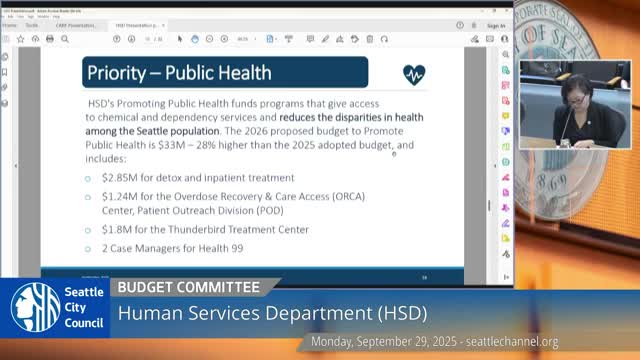Seattle City Council allocates $7.35M to enhance public health and behavioral services
September 30, 2025 | Seattle, King County, Washington
This article was created by AI summarizing key points discussed. AI makes mistakes, so for full details and context, please refer to the video of the full meeting. Please report any errors so we can fix them. Report an error »

The Seattle City Select Budget Committee convened on September 29, 2025, to discuss significant budget allocations aimed at enhancing public health and safety services in the region. The meeting highlighted the city’s commitment to addressing pressing community needs through increased funding and strategic partnerships.
The session opened with a report on the city’s investment in public health, emphasizing a redesigned contract with Public Health Seattle King County. This adjustment aims to align services more closely with city priorities, reflecting a total budget increase for the Human Services Department (HSD) to $33 million, marking a 28% rise from the previous year.
Key discussions included the allocation of $2.85 million from the public safety sales tax to enhance mental health services, including withdrawal management and inpatient treatment for substance use disorders. The HSD plans to issue a request for proposals in 2026 to identify suitable service providers.
Another significant initiative discussed was the funding of $1.24 million for the DESC ORCA Center's specialized outreach team, known as the ORCA pod. This program aims to provide low-barrier access to recovery services and medication for opioid use disorder, targeting outreach to shelters and supportive housing across the city.
The committee also addressed a one-time capital investment of $1.8 million to reopen the Seattle Indian Health Board's Thunderbird Center, a 92-bed facility dedicated to behavioral health services, including support for pregnant and parenting adults. This center will incorporate traditional Indian medicine into its recovery programs.
Further, the meeting underscored the importance of competitive wages for human services workers, with a proposed budget of $11.7 million allocated for inflationary and wage increases. This funding aims to support the retention and recruitment of skilled professionals in the human services sector, which has faced challenges in recent years.
The session concluded with a call for collaboration among various funding sources to ensure the sustainability of these critical services. The committee expressed gratitude for the ongoing support from the mayor's office and emphasized the essential role of HSD staff and community partners in delivering vital services to the region.
As the committee opened the floor for questions, members expressed their commitment to addressing the complexities of service delivery and ensuring that the city’s human services framework effectively meets the needs of its residents. The discussions set the stage for continued efforts to enhance public health and safety in Seattle.
The session opened with a report on the city’s investment in public health, emphasizing a redesigned contract with Public Health Seattle King County. This adjustment aims to align services more closely with city priorities, reflecting a total budget increase for the Human Services Department (HSD) to $33 million, marking a 28% rise from the previous year.
Key discussions included the allocation of $2.85 million from the public safety sales tax to enhance mental health services, including withdrawal management and inpatient treatment for substance use disorders. The HSD plans to issue a request for proposals in 2026 to identify suitable service providers.
Another significant initiative discussed was the funding of $1.24 million for the DESC ORCA Center's specialized outreach team, known as the ORCA pod. This program aims to provide low-barrier access to recovery services and medication for opioid use disorder, targeting outreach to shelters and supportive housing across the city.
The committee also addressed a one-time capital investment of $1.8 million to reopen the Seattle Indian Health Board's Thunderbird Center, a 92-bed facility dedicated to behavioral health services, including support for pregnant and parenting adults. This center will incorporate traditional Indian medicine into its recovery programs.
Further, the meeting underscored the importance of competitive wages for human services workers, with a proposed budget of $11.7 million allocated for inflationary and wage increases. This funding aims to support the retention and recruitment of skilled professionals in the human services sector, which has faced challenges in recent years.
The session concluded with a call for collaboration among various funding sources to ensure the sustainability of these critical services. The committee expressed gratitude for the ongoing support from the mayor's office and emphasized the essential role of HSD staff and community partners in delivering vital services to the region.
As the committee opened the floor for questions, members expressed their commitment to addressing the complexities of service delivery and ensuring that the city’s human services framework effectively meets the needs of its residents. The discussions set the stage for continued efforts to enhance public health and safety in Seattle.
View full meeting
This article is based on a recent meeting—watch the full video and explore the complete transcript for deeper insights into the discussion.
View full meeting
